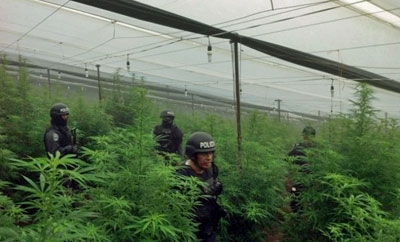Honduran authorities have reported the first ever discovery of an opium plantation in the country, a new milestone marking the country’s ever-growing role in the international drug trade.
On January 31, Honduran officials reported that they had discovered and destroyed a high-tech greenhouse growing opium poppies and marijuana on a mountain in west Honduras, Inter Press Service reported.
The greenhouse was found in the municipality of La Iguala, 400km from capital city Tegucigalpa and 1,600 meters above sea level. The location is only reachable by horseback or all-terrain vehicle, and becomes inaccessible during the rainy season.
The raid discovered 1,800 opium poppy plants and 800 cannabis plants. The structure itself was reportedly 100 meters long and 40 meters wide, air-conditioned, with a large generator, a modern irrigation system and other high-tech equipment.
Two people were arrested in the raid, a Honduran laborer and a Colombian who managed the farm and had been previously arrested and released, reported La Prensa.
Carlos Mejia, a deputy superintendent of the National Police who headed the operation, told IPS, “We suspect there are many more plantations in these enormous western mountains, so we are combing the entire region.”
InSight Crime Analysis
The revelation that Honduras is now a location for high-tech opium production is just the latest sign of to the country’s slide into the hands of powerful criminal elements. Since a 2009 coup, the presence of foreign organized crime has increased markedly and, according to the US State Department’s latest estimate, 75 percent of cocaine leaving South America by plane transits through the Central American nation.
SEE ALSO: Honduras News and Profiles
Part of this criminal expansion has involved the growth of drug processing, with several cocaine labs discovered in Honduras since 2011, but the arrival of opium poppy cultivation is a major new development suggesting criminal operations are becoming increasingly sophisticated and are confident of being able to operate with impunity.
While foreign criminal organizations have played a large role in driving this evolution — the cocaine processing plant discovered in 2011 allegedly belonged to Mexico’s Sinaloa Cartel — there are growing indications that homegrown organized crime groups are also building strength and moving up the drug trafficking value chain.
If local criminal groups do successfully increase their role in drug production, it raises the possibility that Honduras could soon generate its own transnational criminal operations and become major players in the international drug trade.

